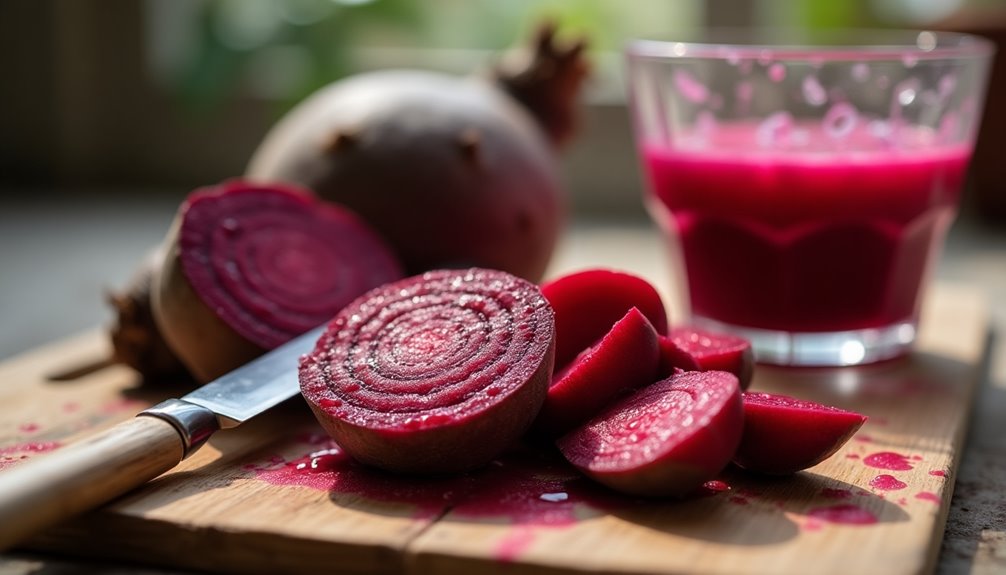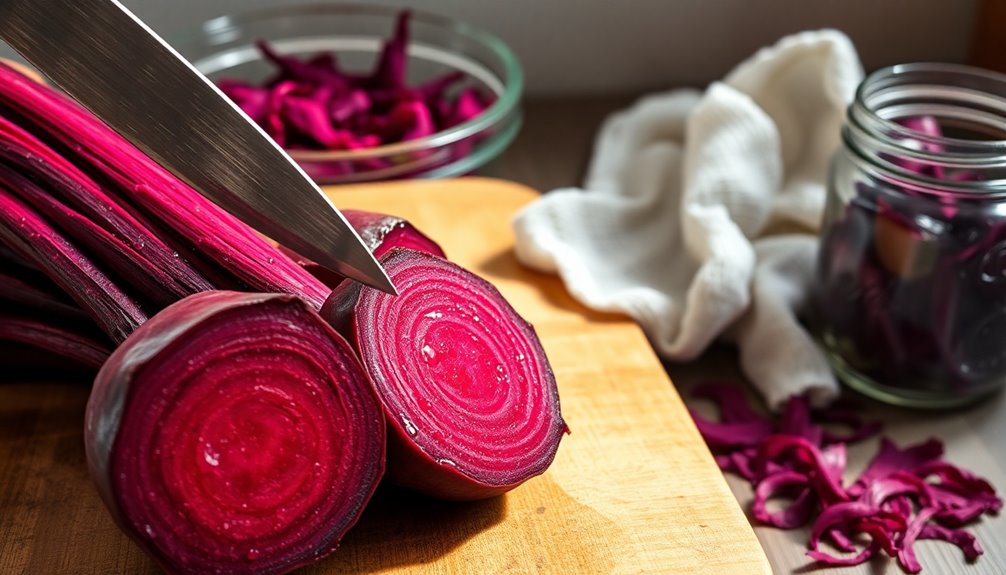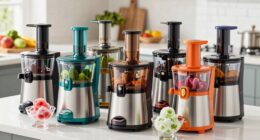To juice beets without a juicer, start by washing, peeling, and grating the beets. Soak the grated beets in 200-300ml of water for 30 minutes, then strain the mixture using a mesh strainer or nut milk bag to extract the juice. For a smoother consistency, you can cook the beets until soft and then mash them. Enhance the flavor by adding a squeeze of lemon juice. Stick around to discover more tips on enjoying your beet juice!
Key Takeaways
- Wash, peel, and grate beets to maximize juice extraction by increasing surface area before soaking in water for 30 minutes.
- Use a mesh strainer or nut milk bag to strain the soaked beets, pressing down to extract as much juice as possible.
- Alternatively, boil cut beet pieces until soft, then mash with a potato ricer or food mill for smoother juice consistency.
- Enhance the flavor by adding a teaspoon of fresh lemon juice, which also helps prevent oxidation and retains freshness.
- Enjoy beet juice straight, mix with other juices, or add to smoothies to incorporate unique flavors and nutritional benefits.

Juicing beets without a juicer might seem challenging, but it's easier than you think. With a few simple steps and some common kitchen tools, you can extract the vibrant, nutritious juice from beetroot right at home. Plus, you'll get to enjoy all the health benefits beet juice has to offer, like improved blood flow and enhanced stamina.
To start, you'll need to wash and peel your beets. It's important to remove the skin since it can have a bitter taste. Once they're clean, you can grate the beets using a box grater or a food processor. If you opt for the food processor, it'll save you some time and effort. Grating the beets increases the surface area, making it easier to extract the juice later.
Next, soak the grated beets in about 200-300ml of water for around 30 minutes. This soaking process helps to release the juice from the beetroot. After the soaking time is up, it's time to strain the juice. You can use a mesh strainer or a nut milk bag for this step. If you're using a nut milk bag, simply pour the soaked beets into the bag, twist it closed, and squeeze to extract the juice. If you've got a mesh strainer, place it over a bowl, pour in the mixture, and press down with a spoon to get as much juice out as possible.
Make sure to discard or reserve the pulp for other uses, like adding it to smoothies or baking.
If you prefer a smoother juice, you might want to consider cooking the beet chunks instead. Cut your beets into smaller pieces, boil them in water until they're soft, then pass them through a potato ricer or food mill. This method will yield a smoother consistency and still allow you to strain the juice easily. It's a great alternative if you don't have a blender or food processor.
To add a little zing to your juice, consider incorporating a teaspoon of fresh lemon juice. Not only does it brighten the flavor, but it also helps minimize oxidation, keeping your juice fresher for longer. Plus, the vitamin C from the lemon juice boosts the overall health benefits of your drink.
Now that you've successfully extracted the juice from your beets, you can enjoy it on its own or mix it with other juices for a delicious blend. Whether you drink it straight or add it to smoothies, you'll appreciate the earthy flavor and vibrant color of your homemade beet juice.
Frequently Asked Questions
Can I Juice Raw Beets Without a Juicer?
Yes, you can definitely juice raw beets without a juicer!
Start by grating the beets using a box grater or a food processor to create a fine puree. Soak those grated beets in 200-300ml of water for about 30 minutes to help extract the juice.
Then, use a mesh strainer or nut milk bag to press the mixture and collect the liquid. You'll have fresh beet juice ready to enjoy!
Should You Peel Beets Before You Juice Them?
Whether you should peel beets before juicing really comes down to personal preference.
If you're okay with a slightly earthy flavor and want to keep those extra nutrients, just wash them thoroughly and leave the skin on.
However, if you prefer a smoother texture, peeling might be the way to go. It can enhance the juice's flavor and consistency, especially if you're sensitive to the texture of the skin.
Is It OK to Juice Raw Beets?
Juicing raw beets is definitely safe and beneficial for most people.
They're packed with nutrients that can boost your blood flow and lower blood pressure.
However, since they're high in natural sugars, you should enjoy beet juice in moderation, especially if you're monitoring your sugar intake.
Start with small amounts to see how your body reacts, as some folks may experience digestive discomfort or notice reddish urine after consuming them.
Is There a Downside to Drinking Beet Juice?
Yes, there can be downsides to drinking beet juice. You might find that its high sugar content raises concerns if you're monitoring carbs, especially if you're diabetic.
Some people experience digestive issues, like an upset stomach or gas, after consuming it. You could also notice reddish urine, a harmless condition called beeturia.
Additionally, if you have kidney issues or take certain medications, it's wise to consult your healthcare provider before enjoying beet juice.
Conclusion
In the end, juicing beets without a juicer is all about creativity and resourcefulness. You can blend, strain, and savor the rich flavors of fresh beets in your kitchen. You can embrace the vibrant color and the earthy taste, and you can enjoy the health benefits that come with each sip. So grab those beets, get a little messy, and let your culinary adventure begin—because juicing should be fun, not complicated!
Cindy thoroughly researches juicing trends, techniques, and recipes to provide readers with practical advice and inspiration. Her writing style is accessible, engaging, and designed to make complex concepts easy to understand. Cindy’s dedication to promoting the advantages of juicing shines through her work, empowering readers to make positive changes in their lives through the simple act of juicing.











